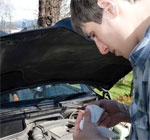Few events are as exciting as earning a license to drive. To most teenagers, driving means one thingāfreedom. Finally, the world seems to open up. You no longer have to wait on othersā schedules and can take yourself where you need to go at whatever time works best for you.
Driving also means comfort. The driverās seat is always the best seat. You can set the temperature so it is comfortable for you and position your seat just the way you like.
Additionally, driving means you can assist others: offering rides to friends to and from work or school, picking up groceries for your parents, or helping someone move by carrying boxes in your trunk or backseat. You can also make yourself available in a host of other ways, because you do not always have to rely on others to drop you off. This means you can even visit friends and family more often. (In every case, however, be sure to clear plans with your parents.)
As exciting as operating a car can be, there is still one daunting obstacle to overcome before receiving your much-desired licenseāthe driverās test! After hours of grueling practice and an intense test, you may feel like you have earned the right to be behind the wheel.
But have you?

Source: canstockphoto.com
Like many things in the Western world, driving is a luxury, not a right. It is not required to stay alive. The majority of people around the world do just fine without cars, even as adults. And if you understand the way laws are written in any country that gives out driverās licenses, then you realize that it can be easily revoked if it is abused.
While a license demonstrates you are āqualified to operate a vehicle,ā it does not mean that you are necessarily mature enough to handle the additional responsibilities that come with operating an automobile. Driving involves much more than simply keeping the car on the road.
Even if you are not of driving ageāand may not be for several yearsāit is important to begin preparing now for this substantial step in life. As you approach your mid-teens, there are many points to consider before you are responsible enough to truly be considered āroad worthy.ā
Car Maintenance
As with most things in life, your vehicle will wear out if you do not take care of it.

Source: canstockphoto.com
There are many stories of people who forgot to change the car oil, only to have the vehicle stop running on a secluded country road or catch fire. If you have not heard one of these cautionary tales, seasoned drivers likely have a few to share. To avoid experiencing any of these mechanical pitfalls, there are a few things you will want to keep in mind.
Monitor the oil: It is best to check the oil levels fairly often, such as every other time you get gas. If you do not get fuel regularly, you should probably check it at least once a month. For older cars, you should check it more often, as these tend to burn oil.
Check tire pressure: If air levels on your tires are too low or too high, your car can be difficult to control. This can usually be monitored by using meters at gas stations. It is better, however, to use a more accurate pressure meter, which can be inexpensively obtained from a local auto parts store.
Watch fluid levels: In addition to oil, there are several fluids in your car, including fuel, windshield washing fluid, transmission fluid and engine coolant (also called antifreeze), among others. All of these need to be kept at appropriate levels to keep a car running smoothly.
Keep track of general wear and tear: Do the windshield wipers need to be replaced? Does the car need new lights or tires? Is it time to renew the carās registration? You must pay attention to all of these things so you will notice when they need to be addressed.
Before performing any car maintenance, be sure to read the manual. Most modern cars come with thorough instructions explaining basic automotive care, and recommended maintenance schedules, as well as how often you should check fluids, etc.
If you are interested in showing your parents that you are ready for getting a license or owning your own car, maintenance is an effective way to show your enthusiasm. Helping your parents care for their vehicles, either by reminding them or by offering to do the service for them (with their permission of course), will demonstrate you are able to take initiative and are ready to handle the responsibility of driving.
Loaded Weapon
While driving is enjoyable and fun, there is another side to it that many fail to take to heart: it is serious. Each time you put a vehicle into gear and press the gas pedal, you must keep this in mind.
Every year, over 30,000 people are killed in car accidents in the United States. On average, there is about one fatality for every 100 million miles driven. Most people drive a little more than half that in their lifetimes. Realize that this number does not count people who are maimed or severely injured in car crashes.
Of those killed, many were not the driver of the car. Whether passengers or simply pedestrians in the wrong place at the wrong time, these people lost their lives because a bad driver overestimated his ability to control the roughly 3,000-pound potential weapon he was operating.
Make these numbers live in your mind! Realize they represent real people, many of whom were children, mothers, grandparents and babies. Would you be able to live with yourself if you ended a small childās life and shattered a family, simply because you wanted to get to school a little faster? This may be difficult to contemplate, but consider it wellāit is the reality you face each time you drive.
Your Responsibility
As a new driver, you have one automatic disadvantageāyou are less experienced than others on the road. Statistics show that teenagers are generally worse drivers. The United States Centers for Disease Control and Prevention reported, āMotor vehicle crashes are the leading cause of death for U.S. teens, accounting for more than one in three deaths in this age groupā¦Per mile driven, teen drivers ages 16 to 19 are four times more likely than older drivers to crash.ā
Although you may be careful, you will generally not be as good a driver as those with more experience under their belts. Therefore, it is your responsibility to make sure none of the terrible things mentioned above happen while you are behind the wheel.
One way to do this is to understand local and national driving laws. Many accidents occur because drivers are confused about which vehicle can proceed first at an intersection, for example.
Next, obtain a driving manual and study it thoroughly. Ask your parents questions about anything you do not understand.
Once you have a good grasp on how your car operates and driving laws, it is time to put that information into action. Consider driverās education programs available in your area. Both in-school and extracurricular training programs can be extremely beneficial to new drivers. Also, try to get as much instruction as possible from your parents, as their experience can save you from all sorts of trouble.
Finally, and perhaps most important, pay attention. When you first hit the road, you will find that many distractions compete for your attention. Stay focused. Avoid talking or texting on a cellphone as it often causes accidents. Be careful when using the car stereo or other electronic devices as they may cause you to lose your focus. Other distractions, such as eating while driving, combing your hair, or reaching for an item in the backseat, will also inhibit your ability to keep your eyes on the roadāand can have tragic consequences.
On the Road
Remember, driving a car is a privilege. Do not forget to show your appreciation for the opportunity to enjoy it. Take care of your vehicle. Use it to help others. And use it to simplify your parentsā schedule, which will make them glad you have grown to the point that you are capable of handling such a responsibility.
Constantly remind yourself of the dangers discussed previously. Take appropriate precautions to avoid putting yourself and others in dangerous situations. While this does not mean you have to be constantly worried or drive extremely slowly expecting danger around every corner, you should understand that you are taking your life as well as othersā into your hands each time you get behind the wheel.
Prepare now to handle the responsibility that accompanies becoming a licensed driver. Perhaps you could wash and wax the outside of the car and vacuum the interior, making sure to remove all trash. Start small, showing your parents first that you appreciate your family car and understand it is a valuable resource that involves proper care. By the time you reach driving age, they will be more confident that you will not take operating a vehicle lightly.
How well you handle the responsibility of drivingāand preparing for itāwill form habits for dealing with other challenges later in life. Start on the right course now and prepare for the open road!


















